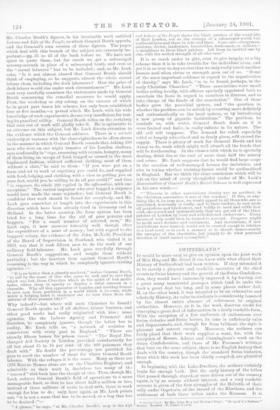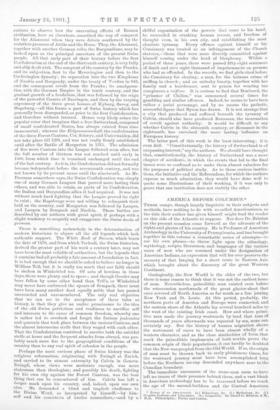SWITZERLAND.* IT would be more easy to give an opinion
upon the joint work of Mrs. Hug and Mr. Stead if one knew with what object their History of Switzerland had been written: If they intended it to be merely a pleasant and readable narrative of the chief events in Swiss history and the growth of the Swiss Confedera- tion, they would have immensely improved it by leaving out a great many immaterial passages which tend to make the book a great deal too long, and in some places rather dull. If, on the other hand, it was intended to be an exhaustive and scholarly History, its value to students is considerably lessened by the almost entire absence of references to original authorities. However, as it is, the work deserves credit for conveying a great deal of information in a fairly readable form, With the exception of a few outbursts of enthusiasm over Swiss victories and Swiss heroes, its tone is sufficiently calm and dispassionate, and, though far from brilliant, the style is pleasant and correct enough. Moreover, the authors can fairly plead that their work supplies a want, for, with the exception of Messrs. Adams and Cunningham's work on the Swiss Confederation, and those of Mr. Freeman's writings that bear on the same subject, there is no English history that deals with the country, though the 'standard Swiss histories, from which this work has been chiefly compiled, are plentiful enough.
In beginning with the Lake-Dwellers, the authors certainly begin far enough back. But the early history of the tribes that passed through, stayed, or were driven out of the country again, is by no means without interest, and a very readable account is given of the first struggles of the Helvetii, of their sally under Orgetorix, of the inroad of the Rhsetians, and the settlement of both these tribes under the Romans. It is
* Serif te,,lani. By Mrs. Linn. Rag and Richard Steal. " St...ry of tho Nations ''
Helios. London t Fiebor Unwin.
curious to observe how the enervating effects of Roman civilisation, here as elsewhere, smoothed the way of conquest for the Alamanni when they were driven southward by the resistless pressure of Attila and the Huns. They, the Alamanni, together with another German tribe, the Burgundians, may be looked upon as the principal ancestors of the present Swiss people. All that early part of their history before the first Confederation at the end of the thirteenth century, is very fully and ably dealt with. The conquest of the country by the Franks, and its subjection, first to the Merovingian and then to the Carlovingian dynasty ; its separation into the two Kingdoms of Swabia and Burgundy, under the treaty of Verdun in 843, and the consequent revolt from the Franks ; its amalgama- tion with the German Empire in the tenth century, and the gradual growth of a feudalism, that was followed by the reign of the powerful Counts of Zaeringen, and then by the varying supremacy of the three great houses of Kyburg, Savoy, and Hapsburg,—all this forms a part of Swiss history which has generally been disregarded, as prior to the first Confederation, and therefore without interest. Hence very likely arises the popular error that imagines that a free Switzerland, composed of small confederated States, has always existed from time immemorial ; whereas the Bidgenossenschaft, the confederation of the three Forest Cantons, Uri, Schwyz, and Unterwalden, did not take place till 1291, and was not really firmly established until after the Battle of Morgarten in 1315. The admission of five more Cantons into the League followed soon after, but the full number of thirteen was not reached until early in 1500, from which time it remained unchanged until the end of the last century. As it is, the Confederation did not formally become independent before the seventeenth century, and was not known by its present name until the nineteenth. As Mr. Freeman somewhere says, the Swiss Confederation was simply one of many German Leagues that proved more lasting than others, and was able to retain, as parts of its Confederation, the Italian and Burgundian allies it had acquired. It was not without much hard fighting that the League proved its right to exist ; the Hapsburgs were not willing to relinquish their hold on the country, and Morgarten was followed by Laupen, and Laupen by Sempach and Naefels. These battles are described by our authors with great spirit, if perhaps with a slight tendency to magnify and exaggerate the Swiss deeds of prowess.
There is something melancholy in the determination of modern historians to abjure all the old legends which lack authentic support. The White Book of Semen, which bears the date of 1470, and from which Tschudi, the Swiss historian, derived the greater part of his work a century later, may not have been the most reliable of authorities, but the legends that it contains had all probably a fair amount of foundation in fact. It is bad enough that we should be asked to believe no longer in William-Tell, but it is really too much that our faith should be shaken in Winkelried: too. Of acts of heroism in those days, there were plenty and to spare ; and though Gessler may have fallen by some other hand than Tell's, or Winkelried may never have embraced the spears of Sempach, there must have been many another deed equally noble that has passed unrecorded and unremembered. The only real objection that we can see to the acceptance of these tales as history, is that they give an undue prominence to the idea of the old Swiss patriotism and readiness to sacrifice self and interests to the cause of common freedom, whereby one is rather led to overlook and forget the furious jealousies and quarrels` that took place between the various Cantons, and the almost internecine strife that they waged with each other. That the Confederation contrived to survive both the suicidal strife at home and the frequent attacks from abroad, was pro- bably much more due to the geographical conditions of the country than to any real spirit of cohesion in the people.
Perhaps the most curious phase of Swiss history was the religious reformation, originating with Zwingli at Zurich, and carried to its utmost extremity by Calvin in Geneva. Zwingli, whose_ views were moderate enough, was more statesman than theologian ; and possibly his death, fighting for his own city against the Forest Cantons, was the best thing that can be remembered of him. Calvin has left a deeper mark upon his country, and, indeed, upon our own also. He demanded a blind and implicit obedience to the Divine Word, as interpreted by himself,—by him- self and his consietoire of twelve counsellors,—and by a skilful organisation of the powers that came to his hand, he succeeded in crushing human reason, and freedom of thought even, in his own city, and establishing the most absolute tyranny. Every offence against himself or his Consistory was treated as an infringement of the Church statutes,—those that were more directly committed against himself coming under the head of blasphemy. Within a period of three years, there were passed fifty-eight sentences of death and over eight thousand of imprisonment on persons who had so offended. In the records, we find girls cited before the Consistory for skating ; a man, for the heinous crime of sniffing in church ; and an unlucky beauty, together with her family and a hairdresser, sent to prison for wearing too sumptuous a coiffure. It is curious to find that Bonivard, the "prisoner of Chinon," was summoned several times for gambling and similar offences. Indeed, he seems to have been rather a jovial personage, and by no means the pathetic., sorrowful figure that Byron has drawn. It is not strange that a city that produced and suffered beneath the tyranny of Calvin, should also have produced Rousseau, the incarnation of revolt against authority. It would be difficult to say whether Calvin in the sixteenth century, or Rousseau in the eighteenth, has exercised the more lasting influence on European history.
The latter part of this work is the least interesting; it is even dull. "Constitutionally, the history of Switzerland is of surpassing interest," say the authors. We should have thought that, constitutionally, the history of Switzerland was a mere chapter of accidents, in which the events that led to the final issues were so confused as to make them almost valueless for. the purposes of political study. As to those curious institu- tions, the Initiative and the Referendum, for which the authors- express so much admiration, they would have done well to. quote some illustrations of their working, if it was only to prove that one institution does not stultify the other.







































 Previous page
Previous page